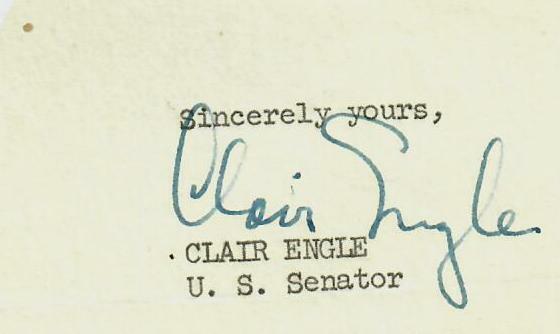|

On eBay Now...
"California Senator" Clair Engle Cut Signature For Sale

When you click on links to various merchants on this site and make a purchase, this can result in this site earning a commission. Affiliate programs and affiliations include, but are not limited to, the eBay Partner Network.

"California Senator" Clair Engle Cut Signature:
$49.99
Up for sale "California Senator" Clair Engle Clipped Signature.
ES-7347 Clair Engle (September 21, 1911 – July 30, 1964) was an American politician of the Democratic Party and a United States Senator from California. He is best remembered for participating in the vote breaking the filibuster of the Civil Rights Act of 1964 in the US Senate while partially paralyzed and unable to speak, shortly before his death from a brain tumor. Engle was born in Bakersfield, to Fred Engle, a rancher who had been a teacher and a lawyer, and his wife, Carita. His parents named him after his aunt, who had assisted in his birth, and his name would become the source of many folksy stories over the years. Like his two brothers, he was active in outdoor activities and attended public schools in Shasta and Tehama Counties. His fellow students at Red Bluff High School elected him their student body president. In 1928, he enrolled at Chico State Teachers College, and he graduated in 1930. He then attended University of California Hastings College of the Law, and graduated in 1933. Although Engle had a reputation for straight-laced religiosity at both institutions, he eloped to marry his first wife, Hazel. They divorced in 1948 and Engle married his second wife, Lucretia Caldwell, a congressional secretary from San Jose. Admitted to the California bar in 1933, Engle set up a practice in Corning and soon ran for District Attorney of Tehama County. Just 23 years old at the time of his victory, he would hold that office from 1934 to 1942. In 1942, he won election to the California Senate, representing Tehama, Glenn and Colusa Counties but ended up serving in that body for little more than a year. His main accomplishment was passing a law to allow the conversion of unused fairgrounds in order to house migrant farmworkers and ease a severe labor shortage. Engle won election as a Democrat to the U.S. Senate in 1958, the year of a Democratic landslide. He defeated the incumbent Governor Goodwin J. Knight, thus becoming the first Democrat elected to that Senate seat in the 20th century. He succeeded William F. Knowland, who had given up the seat in an unsuccessful run for governor, losing to Pat Brown. He began his term on January 3, 1959. He worked with Senator Thomas Kuchel to pass the San Luis water project, the West Coast powertie and the Point Reyes National Seashore. He also promoted federal public transit assistance and civil rights legislation to assist his urban constituents. However, on August 24, 1963, Senator Engle underwent surgery to remove a brain tumor, which left him partially paralyzed, forcing him to miss several Senate sessions, and he ultimately withdrew from his re-election campaign. On April 13, 1964, the gravity of Engle's health problems was evident as he attempted to introduce a resolution calling for a delay in constructing the Bodega Bay Nuclear Power Plant at Bodega Head, located in Sonoma County. He was given permission to speak, but was unable; a colleague presented the resolution instead. Engle officially ended his re-election campaign on April 28, 1964, just four days after undergoing his second brain operation in eight months. He chose not to endorse either of his Democratic challengers, California State Controller Alan Cranston and former presidential press secretary Pierre Salinger. That decision came because state Democratic leaders refused to endorse him unless he provided details concerning his health. On June 10, 1964, during the roll call for the historic, successful effort to break the filibuster on what would become the Civil Rights Act of 1964, when the clerk reached "Mr. Engle", there was no reply. The tumor had robbed Engle of his ability to speak. Slowly lifting an arm, he pointed to his eye, thereby signaling his affirmative vote ("aye").The cloture vote was 71–29, four votes more than the two thirds required to end the filibuster. Nine days later, the Senate approved the Act itself.


“California Senator” Alan Cranston Hand Signed 3X5 Card Dated 1969 $20.99

“California Senator” George Perkins Cut Signature Mounted $139.99

“California Senator" S. I. Hayakawa Signed 4X6 Card $48.99

VICE PRESIDENT KAMALA HARRIS CALIFORNIA SENATOR PORTRAIT 4X6 PHOTO $7.97

1964 GEORGE MURPHY SENATE California senator campaign Button $5.00

"California Senator" Clair Engle Cut Signature $34.99

“California Senator" S. I. Hayakawa Signed 8X10 Color Photo $69.99

“California Senator” John Seymour Signed 3X5 Card W/ Rare Stamp COA $69.99
|